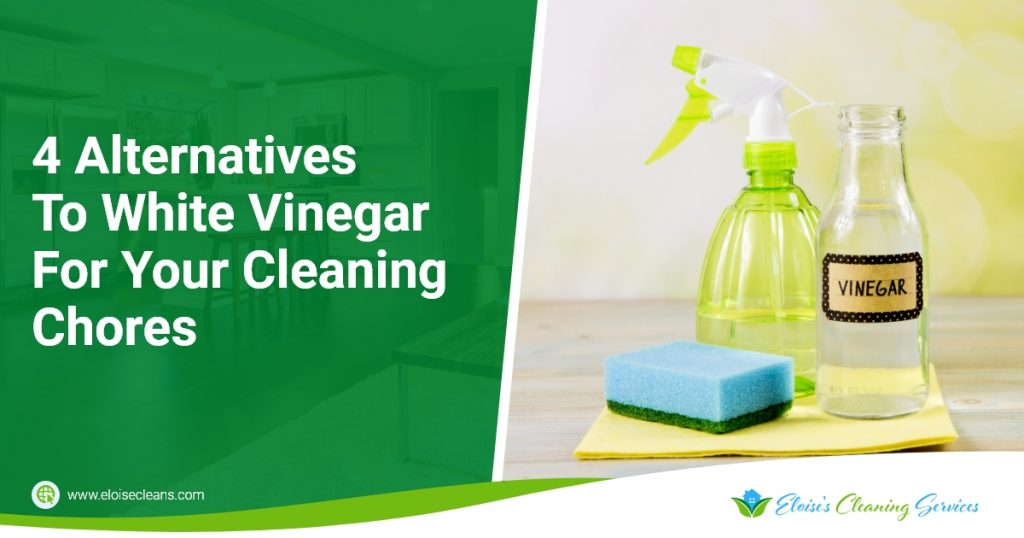
When it comes to eco-friendly cleaning solutions, white vinegar often takes the spotlight.
However, there are times when you might need alternatives that offer the same effectiveness without the vinegar’s characteristic scent or acidic properties. Whether you’re out of vinegar, seeking a milder option, or tackling surfaces that require a gentler approach, fear not!
Move-in/move-out cleaning is here to unveil four fantastic alternatives for your cleaning chores.
Discover these handy substitutes and embrace a fresh perspective on maintaining a sparkling clean home. Let’s dive into the world of vinegar-free cleaning solutions!
Is white vinegar good for cleaning?
White vinegar has a special place when it comes to DIY cleaning recipes. Vinegar contains acetic acid, and its acidic nature makes it a good-enough grime remover and mild sanitizer.
Besides, while white vinegar is not always an all-natural product, it is less harsh than other cleaning chemicals, and it’s gentler with the environment.
However:
Its acidic nature also makes it risky to use on many surfaces in your home. For example, vinegar can damage rubber seals. Also, it breaks down minerals, making it a big no-no for fixtures and floors made of granite, marble, or any other stone.
What can you use instead of white vinegar?
In short, it depends. For example, if you need an alternative for a homemade cleaner, you can use another type of vinegar, but this fix won’t do if you are avoiding acidic products. Besides, white vinegar has many different uses, so the substitute you pick depends on the task.
Here are a few alternatives to white vinegar.
1. Baking soda
Like vinegar, baking soda is a kitchen staple that you can use for your cleaning chores. However, baking soda is not acidic but alkaline, so it’s safe to use it on surfaces like marble.
Usually, baking soda is best used for scrubbing grime buildup on different areas of your home, whether you use it as a paste or dissolved in water. Here are a few ways you can take advantage of baking soda for cleaning.
2. Liquid dish soap
When it comes to cleaning dirty surfaces in your home, there are few things as effective as soapy water. Most dish soap may not be known as powerful disinfectants, but neither does vinegar.
The only downside of cleaning with soapy water is that you’ll have to rinse the detergent residue—while vinegar evaporates.
3. Hydrogen peroxide
If you are looking for an eco-friendly product to disinfect almost every surface in your home, your best option is hydrogen peroxide. Maybe vinegar is acidic enough to act as a sanitizer, but hydrogen peroxide is better at killing bacteria, fungus, and viruses.
To disinfect a surface, you can use a 50/50 hydrogen peroxide and water solution. Spray it on a clean surface and let it sit for at least 5 minutes.
4. Other types of vinegar
Sometimes, you can replace white vinegar by just picking another type. Any vinegar can work as an alternative when you don’t have a bottle of white vinegar at hand—or if you want to avoid the smell.
Here are some examples.
- Apple cider vinegar: The main difference is the smell and color. Apple cider vinegar has a more bearable odor than white vinegar for some people.
- Balsamic vinegar: The only relevant difference is that balsamic vinegar has a darker color. Avoid using it on your laundry or white surfaces.
- Cleaning vinegar: It has a higher concentration of acetic acid.
Eloise’s Cleaning Services can do the cleaning for you!
Let our trustworthy cleaners do the chores so that you can relax and enjoy a spotless home. You don’t need to worry about the cleaning supplies because we provide everything! Every cleaner undergoes a 12-step hiring process, so we can guarantee they are skilled and reliable.

